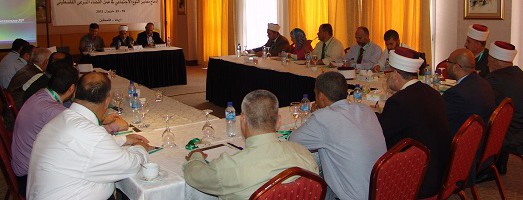Integrating Gender Criteria in the Work of Palestinian Religious Judiciary
Jericho: Tuesday, 19 June 2012 – In cooperation with the Palestinian Council of Religious Judiciary, the Institute of Law (IoL) at Birzeit University launched a specialised training course on Integrating Gender Criteria in the Work of Palestinian Religious Judiciary. The training is one of a series of events organised by the Curricula Development and Training of Judges, Prosecutors, Lawyers and Local Government Staff project.
On behalf of the Chairman of the Council of Religious Judiciary, His Eminence Sheikh Ribhi al Qasrawi highlighted this significant training course, which would enhance functions of the Religious Judiciary, especially in relation to gender-based cases. “Woman is the twin of man. The Religious Judiciary has always adhered to restoring rights to entitled persons, including both men and women. The Judiciary is committed to administering justice and achieving equality.” Sheikh Qasrawi explained. In respect of matrimonial rights, women are involved in many cases, including alimony, dowry, observation, and custodianship. The Religious Judiciary addresses one’s life since they are a fetus until after their death. Accordingly, judges should be well-versed and skilled so that they can restore rights to entitled persons.
Taking place over 19-23 June 2012, the training course will bring together 17 Shari’a court judges from various governorates of the West Bank. In line with the course programme, distinguished, specialist trainers will provide training in a number of relevant areas.
As part of the Millennium Development Goal (MDG) on Promoting Gender Equality and Empowering Women in the occupied Palestinian territory, six UN Agencies, namely UNDP/PAPP, UN-Women, ILO, UNESCO, UNFPA and UNRWA, are implementing a Joint Programme funded by the Government of Spain on Gender Equality and Women's Empowerment, covering the period 2009-2012. The Program aims to achieve three major Outcomes:
1. Reducing gender based violence and all form of violence against women and the girl child;
2. Increasing the representation of women’s and women’s issues in decision making bodies;
3. Advancing equal opportunities for women’s economic participation, especially women survivors of gender based violence.
With reference to output 1.3 “Capacity to provide refuge, security, and access to justice strengthened” and output 2.2, “Organize training and workshops to raise awareness on gender in local authorities and related NGOs”, UNDP seeks to:
1. Develop specialised curricula and training material and conduct training for judges, lawyers and prosecutors on gender issues and the provision of assistance to victims of violence and gender based violence.
2. Provide gender awareness training to local government staff in 15 districts to develop their capacity on mainstreaming gender in district development planning and service provision.





